人教新课标英语必修1 Module 3Travel journal 复习课件(共81张PPT)
文档属性
| 名称 | 人教新课标英语必修1 Module 3Travel journal 复习课件(共81张PPT) |
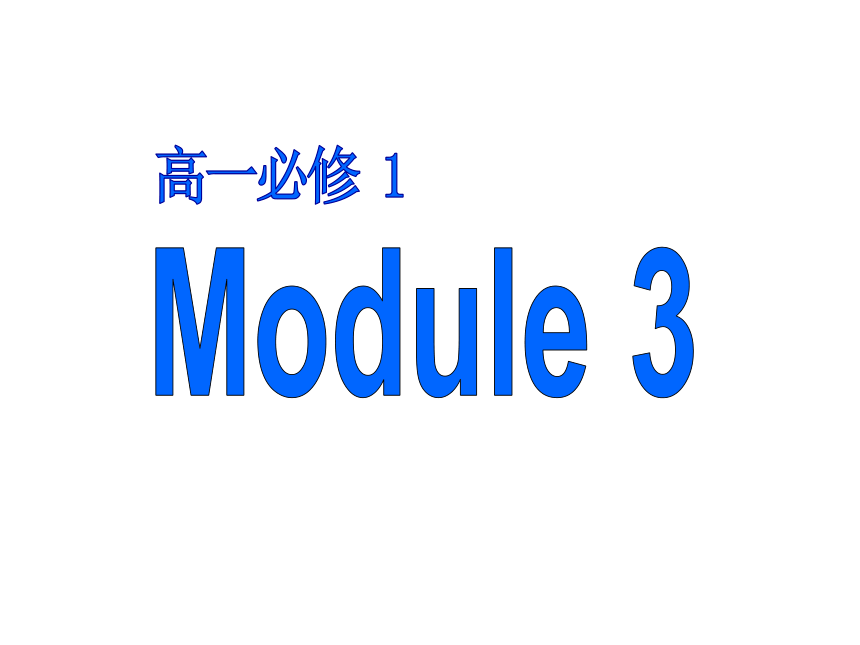
|
|
| 格式 | zip | ||
| 文件大小 | 1.2MB | ||
| 资源类型 | 教案 | ||
| 版本资源 | 人教版(新课程标准) | ||
| 科目 | 英语 | ||
| 更新时间 | 2019-10-16 21:33:18 | ||
图片预览



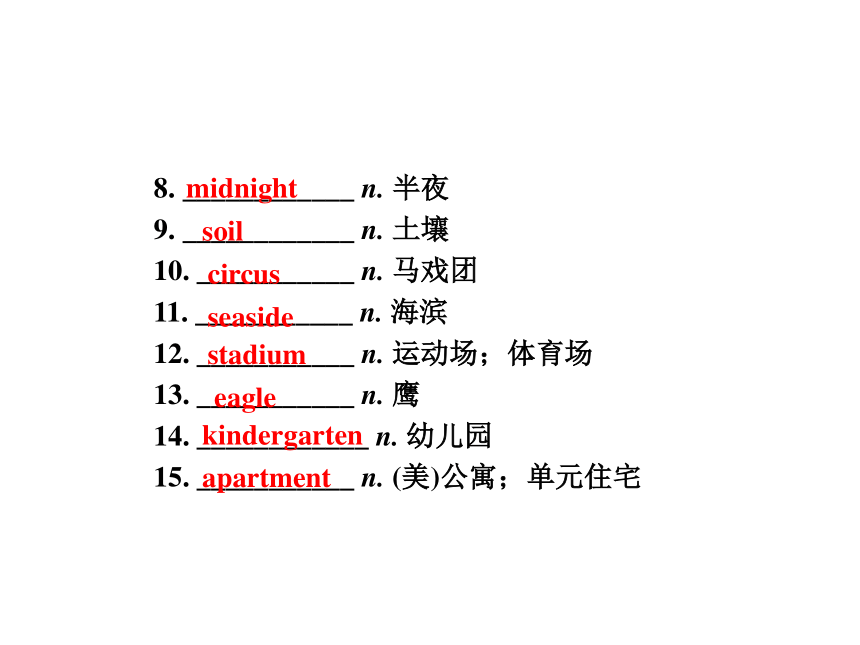
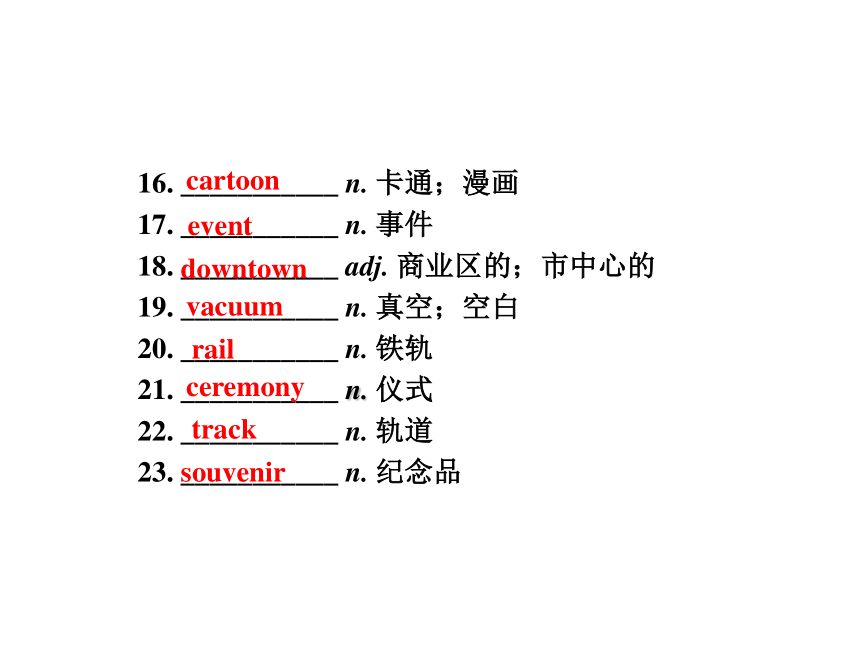
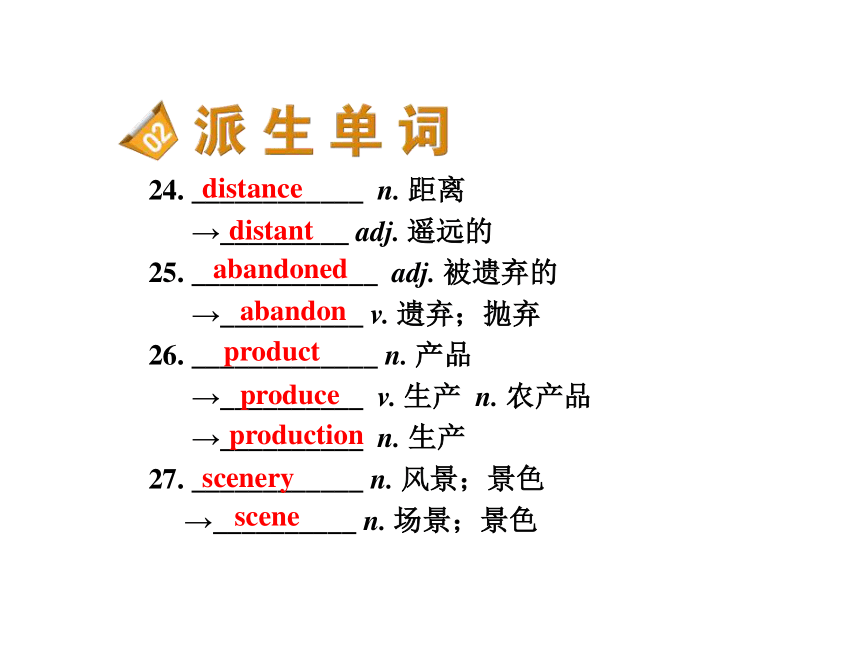
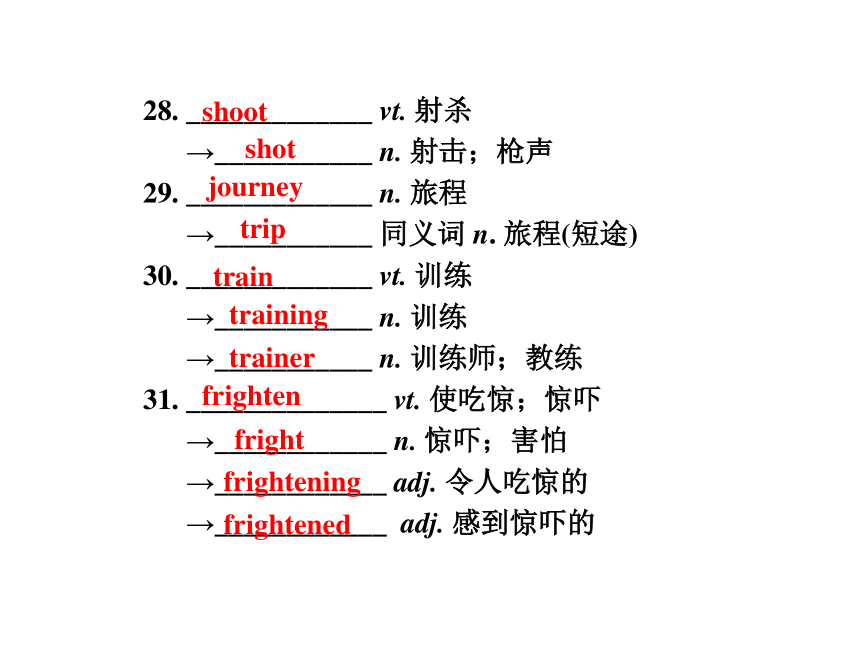
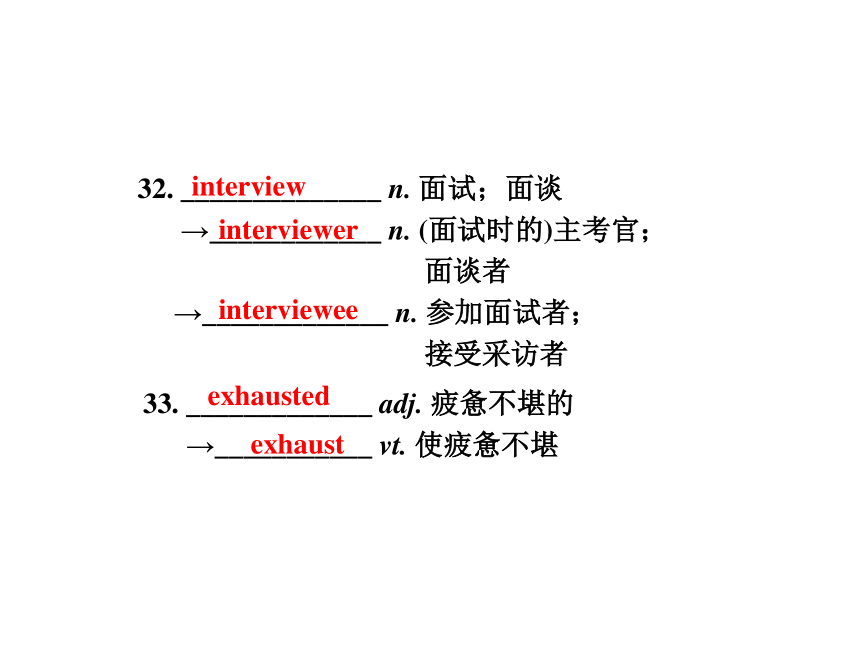
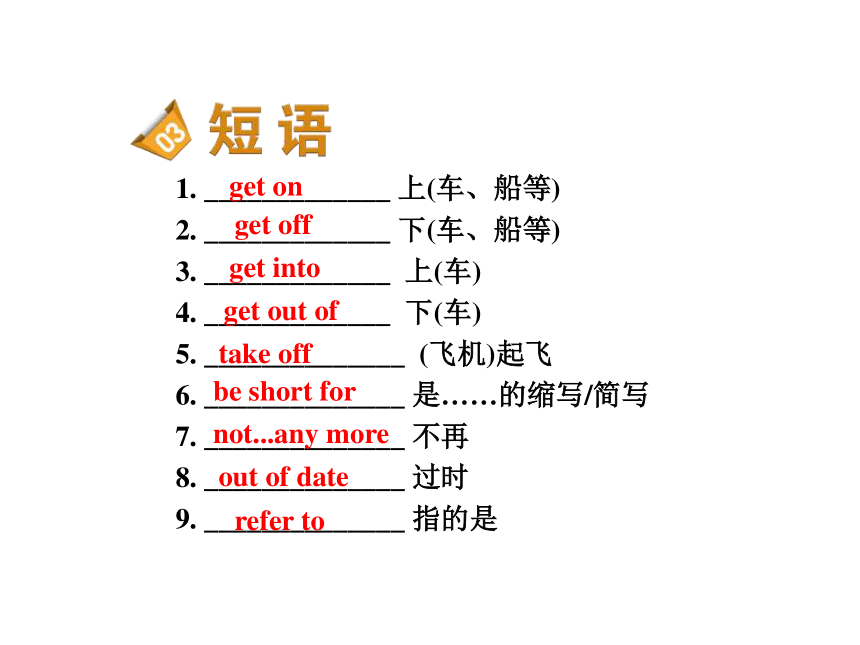
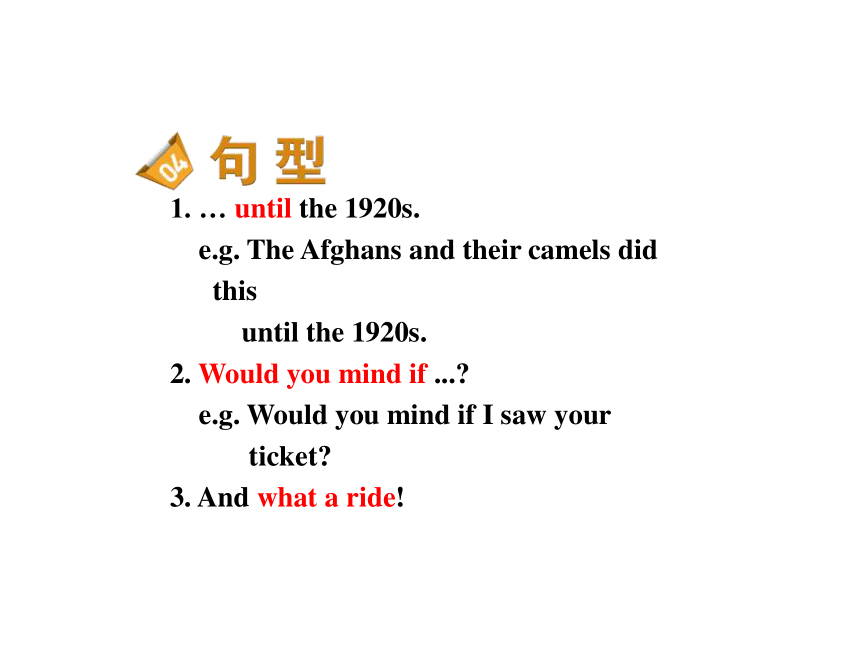
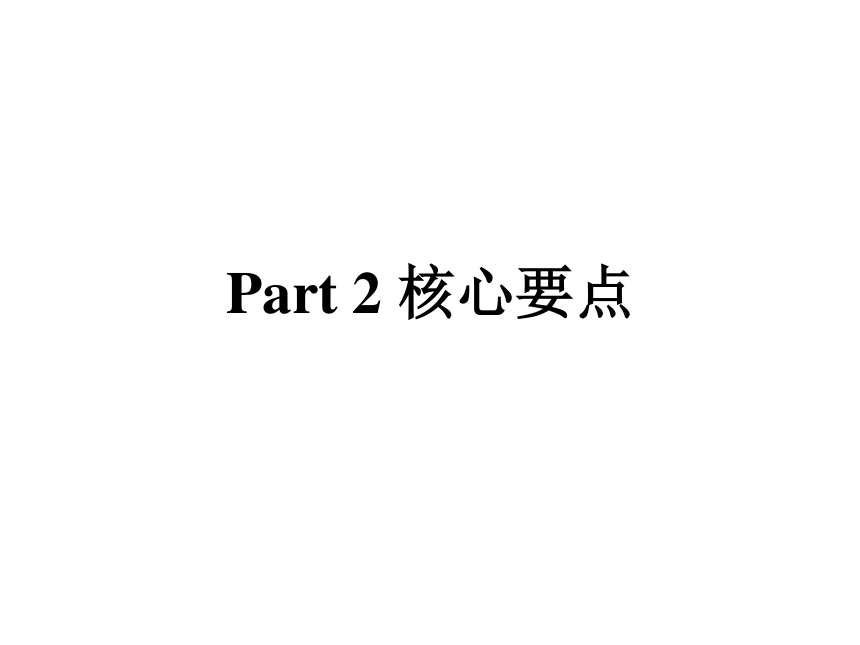
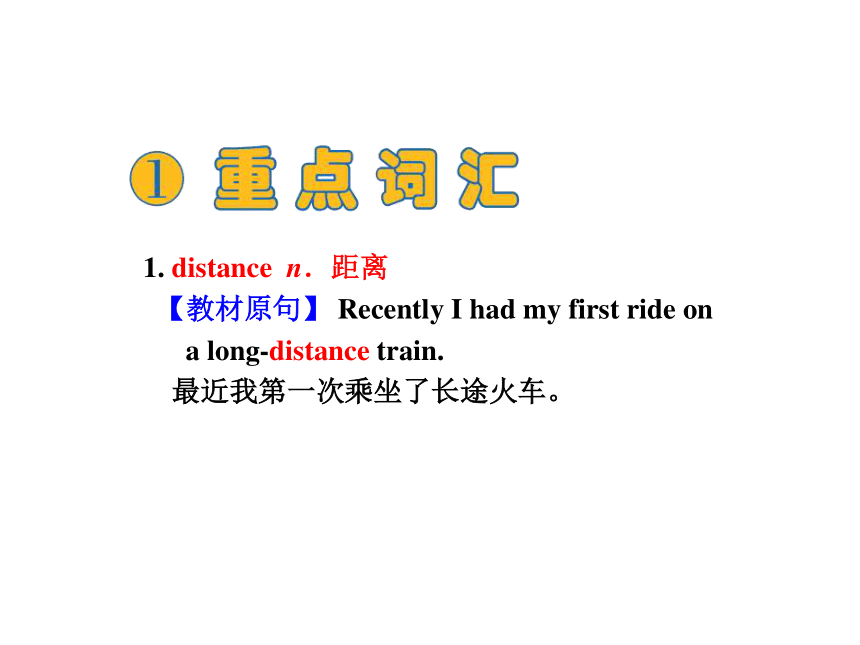
文档简介
(共81张PPT)
Part 1 基础知识
1. ___________ n. 直升飞机
2. ___________ n. 摩托车
3. ___________ n. 电车
4. ___________ n. 骆驼
5. ___________ n. 录音带
6. ___________ n. 沙漠
7. ___________ n. 钻石
helicopter
motorbike
tram
camel
cassette
desert
diamond
8. ____________ n. 半夜
9. ____________ n. 土壤
10. ___________ n. 马戏团
11. ___________ n. 海滨
12. ___________ n. 运动场;体育场
13. ___________ n. 鹰
14. ____________ n. 幼儿园
15. ___________ n. (美)公寓;单元住宅
soil
circus
seaside
stadium
eagle
kindergarten
apartment
midnight
16. ___________ n. 卡通;漫画
17. ___________ n. 事件
18. ___________ adj. 商业区的;市中心的
19. ___________ n. 真空;空白
20. ___________ n. 铁轨
21. ___________ n. 仪式
22. ___________ n. 轨道
23. ___________ n. 纪念品
cartoon
event
downtown
vacuum
ceremony
track
souvenir
rail
24. ____________ n. 距离
→_________ adj. 遥远的
25. _____________ adj. 被遗弃的
→__________ v. 遗弃;抛弃
26. _____________ n. 产品
→__________ v. 生产 n. 农产品
→__________ n. 生产
27. ____________ n. 风景;景色
→__________ n. 场景;景色
distance
distant
abandoned
abandon
product
produce
production
scenery
scene
28. _____________ vt. 射杀
→___________ n. 射击;枪声
29. _____________ n. 旅程
→___________ 同义词 n. 旅程(短途)
30. _____________ vt. 训练
→___________ n. 训练
→___________ n. 训练师;教练
31. ______________ vt. 使吃惊;惊吓
→____________ n. 惊吓;害怕
→____________ adj. 令人吃惊的
→____________ adj. 感到惊吓的
shoot
shot
journey
trip
train
training
trainer
frighten
fright
frightening
frightened
32. ______________ n. 面试;面谈
→____________ n. (面试时的)主考官;
面谈者
→_____________ n. 参加面试者;
接受采访者
interview
interviewer
interviewee
33. _____________ adj. 疲惫不堪的
→___________ vt. 使疲惫不堪
exhausted
exhaust
1. _____________ 上(车、船等)
2. _____________ 下(车、船等)
3. _____________ 上(车)
4. _____________ 下(车)
5. ______________ (飞机)起飞
6. ______________ 是……的缩写/简写
7. ______________ 不再
8. ______________ 过时
9. ______________ 指的是
get on
get off
get into
get out of
take off
be short for
not...any more
out of date
refer to
1. … until the 1920s.
e.g. The Afghans and their camels did this
until the 1920s.
2. Would you mind if ...?? ????
e.g. Would you mind if I saw your
ticket????????
3. And what a ride!?
Part 2 核心要点
1. distance n.距离
【教材原句】 Recently I had my first ride on a long-distance train.
最近我第一次乘坐了长途火车。
【归纳】
in the distance 在远处
at a distance of 在……远的地方
at / from a distance 离一段距离,从远处
within walking distance 在步行可及的地方
keep sb. at a distance 与某人疏远
keep one’s distance from… 与……保持距离
e.g. Can you see the tower in the distance?
The picture looks better from a distance.
The beach is within walking distance of my house.
【拓展】
distant adj. 远的;久远的;远离的;
冷淡的(常接介词from)
distantly adv. 遥远地
be distant towards sb. 对某人冷淡
be distant from... 离……远
思维导图助记
【语境应用】一句多译。
那只狗看上去很凶,所以我决定躲远点。
The dog looked dangerous, so I decided to __________________ from it.
The dog looked dangerous, so I decided to _______________________.
keep my distance
keep me at a distance
用所给词的正确形式完成句子。
I encountered many hikers who were headed to a _________ (distance) camp-ground with just enough time to get there before dark.
distant
2. scenery n. 风景;景色
(教材原句) For the first few hundred kilometres of the journey, the scenery was very colourful.
旅行开始的几百公里,景色多姿多彩。
scenery, scene, view, sight
均含“景色,风景”之意,用法有区别。
scenery为不可数名词,指一个地区的整体自然风景,是由多个scene构成的景色。
e.g. They stopped at the top of the hill to admire
the scenery.
scene指局部的景色,可以是自然形成的,也
可以是人工造成的。
e.g. The sunrise was a beautiful scene.
sight指风景名胜,其复数形式多指人文景观。
e.g. The Great Wall is one of the sights of the
world.
view常指从高处或远处看到的景色。
e.g. There’s a fine view from here.
1) The _________ of sunset was very beautiful.
2) This room has the best ______ of the garden.
3) My sister showed me around the _________ of the city.
4) We passed through much beautiful _________ on our journey through the Lake District.
【语境应用】
scenery, scene, view, sight完成句子。
scene
view
sights
scenery
3. product n. 产品;产物
【教材原句】For many years, trained camels carried food and other supplies, and returned with wool and other products.
许多年以来,经过训练的骆驼运走食品和其他供给物,带回羊毛和其他产品。
【拓展】
produce v. 生产,制造;生长,繁育
producer n. 生产商,制造商
production n. 生产,制造,制作
productive adj. 生产的,(尤指)多产的
productivity n. 生产率,生产效率
【语境应用】完成句子。
1) The factory ____________________ a week.
这家工厂每星期生产一千辆轿车。
2) My bike is a home?__________. ??
我的自行车是国产的。
3) ____________ was up last month.
上个月产量上升了。
produces 1,000 cars
product
Production
4. frighten vt. 使吃惊,惊吓
vi. 惊恐,害怕,受惊吓
【教材原句】The eagle suddenly flew in the air and frightened me.
老鹰在空中突然飞过,吓了我一跳。
【归纳】
frighten sb. into doing sth. 吓得某人做某事
frighten sb. out of doing sth.
吓得某人不做某事
frighten ... away / off 把……吓跑
【拓展】
frightening adj. 引起恐惧的,使惊恐的,骇人的 (说明事物的性质)
frightened adj. 惊吓的,受惊的,害怕的(说明人的状态)
fright n. 恐惧,害怕
【语境应用】单句填空。
Don’t make the children ___________ by showing them ____________ pictures, which may _________ them to death. (fright)
完成句子。
He ________________________________ him all the money.
他恐吓那个女孩把所有的钱都给他。
frightened
frightening
frighten
frightened the girl into giving
1. get on 上(车、船等);进展;进行;相处;
继续进行,进行下去
【教材原句】We got on in Sydney and we got off in Alice Springs, right in the middle of Australia, more than four thousand kilometres away.
我们在悉尼上车,在4000多公里以外的澳大利亚中部的艾丽斯普林下车。
【拓展】
get across 把……讲清楚,使理解???????
get along 进展,进行,相处
get away from 摆脱????????????????????
get down to 开始认真(做某事)
get off 下车,动身????????????????????
get into 上(车)
get out of 下(车)
get over 克服,恢复???????????????????
get rid of 除掉,摆脱
get through 通过; 到达; 完成; 接通电话
2. take off (飞机)起飞;脱掉(衣服等);
突然大受欢迎;迅速流行;
匆匆离开(常与for连用);
取下来,去掉,取消
【教材原句】Internet shopping will already take off when people make sure that it is safe. 当人们确信了网购的安全性时,它就已经成功了。
take...for granted 认为……理所当然,理应如此
take … for… 认为
take up 占据;拿起;着手处理; 从事,开始(做);
接纳(乘客); 继续
take over 接管,接任
take in 欺骗;吸收;理解,领会
take … as … 把……看作……
take after 与……想像
【拓展】
take down 拿下,记录下,拆卸
take back 带回,收回(话)
思维导图助记
【语境应用】写出下列句中take off的含义。
1) He took off his coat as soon as he entered his room. ____________
2) When the delayed flight will take off depends much on the weather. ____________
脱掉
起飞
完成句子。
1) I told Grandpa we were going away, but I don’t think he took it ________.
2) When Mr. Green retired, his son took ________ the business from him.
in
over
3. be short for 为……的缩写
【教材原句】Ghan is short for Afghanistan. Ghan是阿富汗的缩写。
【拓展】
be short of 短缺;缺乏
in short 简言之;总之
for short 为了简短(可称为……)
in short 总之,简言之;
cut short 缩短,打断(某人的话等)
4. not ... any more 不再
表示某一动作或状态从某个时刻开始不再继续,any more通常位于句末。
【教材原句】Then the government built a new railway line, so they didn’t need the camels any more.
后来,政府修了一条新的铁路线,他们就再也不需要骆驼了。
【语境应用】翻译句子。
我做了错事,但我确信以后再也不会了。
I made a mistake, but I’m sure I won’t do it any more.
no more / not...any more
no longer / not...any longer
no more(= not…any more),主要用来表示数量和程度,一般常修饰短暂性动词,指某动作不再重复发生,它所表达的是never again或“没有更多”的含义。
【语境应用】一句多译。
他不再是学生了。
He is no more a student. =
He is not a student any more.
no longer(= not…any longer),主要用来表示时间或距离的“不再”,意在对现在的情况和过去的情况加以比较,所以多用于现在时。它一般修饰延续性动词,表示某个动作或状态不再延续下去。
【语境应用】一句多译。
他不再住这里了。
He no longer lives here. =
He doesn’t live here any longer.
not…any more和not…any longer要放在助动词和be动词后,
no more和no longer则一般要放在行为动词前,be动词后。
5. out of date 过时的,过期的,老式的
【教材原句】It’s out of date.
票过期了。
【拓展】
out of sight 看不见
out of breath 上气不接下气,气喘吁吁
out of control 失控
out of order 出毛病;杂乱无章
out of reach 够不着
out of order 出毛病
out of the question 不可能
out of question 不成问题;毫无疑问
out of work 失业的
out of danger 脱险
out of shape 变形
up to date 现代化的,最新式的
make a date for sth. 定下做某事的日期
have a date with sb. 同某人约会
date back to/from
追溯到……,始建于……
【语境应用】选词填空。
1) Your telephone is ______________. It can’t use Wechat.
2) I checked the files and some of the papers were _________________.
3) The children are completely ______________ since their father left.
4) How could you turn down such a wonderful work when you have been ___________ for a year?
out of work out of date out of order out of control
out of order
out of control
out of date
out of work
6. refer to 提到,说到,涉及;
向某人询问;查阅,参考
to为介词,后常跟名词或代词。
【教材原句】Which of them can refer to
past or present actions?
这些哪个指过去哪个指现在的动作?
【拓展】
refer to...as... 将……称为……
refer …to… 把……委托/交给…..
reference n. 提及;参考;查阅
【语境应用】根据汉语提示补全下列句子。
1) If you don’t know what this means, _____________________ (去查字典).
2) Marcia _______________________________.
(把Jerry称作他的好朋友)
refer to the dictionary?
referred to Jerry as a dear friend
1. The Afghans and their camels did this until the 1920s.
阿富汗人和他们的骆驼这样做一直持续到20世纪20年代。
until “直到……才……”;在肯定句中,与延续性动词连用。
e.g. They remained in Beijing until June.
他们六月前一直呆在北京。
until在否定句中与非延续性动词连用。
在not...until句型中,为了强调,常把not until提
前,主句用倒装语序。
e.g. They don’t leave Beijing until the end of August.
他们在北京一直待到8月。
Not until the end of August did they leave Beijing.
直到八月他们才离开了北京。
【语境应用】单句语法填空。
1) Not until he left his home ______________ (begin) to know how important the family was for him.
2) He _____________________ late in the evening.
他直到晚上很晚才去睡觉。
did he begin??
didn’t go to bed until
2. And what a ride!
多么美妙的一次乘车旅行!
感叹句常用句式:
what用来修饰名词,how用来修饰形容词、副词或动词。
What+a/an+(adj.) +可数名词单数+(主语+谓语)!
What+(adj.) +可数名词的复数+(主语+谓语)!
What+(adj.)+不可数名词+(主语+谓语)!
How+adj.+a/an+可数名词单数+(主语+谓语)!
How+adj./adv.+(主语+谓语)!
How + 主语 +谓语!
【语境应用】一句多译。
你提出了一个多么好的建议啊!
_____________________ you have put forward!
_____________________ you have put forward!
What a good suggestion
How good a suggestion
单句改错。
How great fun it is to sit down and have a good chat with your close friends!
______________
How → What
3. Would you mind showing me your ticket?
if I saw your ticket?
请出示你的票好吗?
(1) Would you mind...? 后面接名词、动词-ing形式以及if引导的从句。
Would/Do you mind one/one’s doing sth?
你介意某人做某事吗?
Would you mind if sb did sth?
介意某人做某事吗?(从句中要用一般过去
时) if从句中要用一般过去时表示虚拟语气。
Do you mind if sb does sth?
介意某人做某事吗?(从句中要用一般现在时)
(2) 回答Would you mind或Do you mind...?
表示不同意时,通常的回答有(有时为了使语气委婉,通常不直接用Yes)。如:
Yes, I do mind.? 是的,我很介意。
Please don’t. 请不要……
Better not, please.? 请最好不要……
I’d rather you didn’t.? 我宁愿你不……
I’m sorry, but... 很抱歉,最好(别)……
表示同意的通常回答有:
Oh, no, please.? 不介意,有请。
No, not at all.? 不介意,一点不介意。
Not at all.? 一点也不介意。
Of course not.? 当然不介意。
No, go ahead.? 不介意,你请吧。
【语境应用】一句多译。
我在这儿抽烟你不介意吧?
Would you mind my/me smoking here?
→Would you mind if I smoked here?
→Do you mind if I smoke here?
动词-ed形式相当于形容词或副词,因此它可以在句中作表语、定语、宾补和状语。
★及物动词的-ed形式作定语时通常既表示完
成,又表示被动。
★不及物动词的-ed形式作定语在意义上只表示
完成不表示被动。
★从位置上看,单个动词的-ed形式作定语时通
常放在被修饰的名词之前;动词-ed形式短语
作定语通常放在被修饰的名词之后。
动词-ed形式
e.g. My borrowed book must be returned
by tomorrow.
The photos taken on the airplane are
wonderful.
She collected these fallen leaves and
put them into the garbage bag.
【拓展】
1. 动词-ed形式短语作定语时,在意义上相当于一个定语从句。
e.g. I like books written by Lu Xun.
= I like books that are written by Lu Xun.
2. 动词-ed形式修饰不定代词或指示代词时,要放在这些词之后。
e.g. There has been nothing changed here
since I left this town.
3. excite, surprise, satisfy等动词的-ed形式通常修饰人,它们的动词-ing形式通常修饰物,但是有时前者也可以修饰物。
e.g. surprised laughter 惊讶地大笑
surprising laughter 使人惊奇的笑声
【语境应用】用括号内动词的正确形式填空。
1. A young man ________ (write) novels came to speak to us yesterday.
2. The EMS ________ (post) yesterday will probably reach my brother in Shanghai in three days.
3. Most of the people ________ (invite) to the party are famous scientists.
4. The children ________ (play) the violin will give a performance next week.
writing??
posted?
invited
playing?
5. Who is the man ________ (stand) by the door?
6. From your ____________ (disappoint) voice, I have to say that is a piece of ______________ (disappoint) news.
7. My grandfather can’t walk around without his ________ (walk) stick.
8. The glass of water is too hot. I prefer some cold ________ (boil) water.
standing
disappointed
disappointing???
walking ?
boiled?
1. Ordinary soap, _______ (use) correctly, can deal with bacteria effectively.?
句意:普通的香皂,只要使用正确,就可以有效除菌。本题考查非谓语动词作状语。use与其逻辑主语为被动关系。
used
2. ___________ (travel) along the old Silk Road is an interesting and rewarding experience.?
句意:沿着丝绸之路旅行是一次既有趣又有益的经历。v-ing在句中可以作主语、宾语、表语、定语。
Traveling
3. Jim has retired, but he still remembers thee happy time?______ (spend) with his students.?
句意:吉姆已经退休,但是他仍然记得和学生度过的那些快乐时光。题干中,被修饰词the happy time与spend为被动关系,且设空处表示“完成”,故用过去分词做后置定语。
spent
4. To return to the problem of water pollution, I’d like you to look at a study?___________ (conduct) in Australia in 2012.?
句意:回到水污染问题,我想让你们看一下高达利亚在2012年进行的研究。study与conduct之间为被动关系,且设空处表示“完成”,故用过去分词作后置定语。
conducted
5. In art criticism, you must assume the artist has a secret message?___________ (hide) within the work.?
句意:在艺术评论中,你必修假定艺术家在作品中有一定的隐含信息。设空处在句中作定语,message与hide之间存在逻辑上的被动关系,且设空处表示动作已经完成,故用过去分词形式。
hidden
6.?____?in?the?poorest?area?of?Glasgow,?he?
had?a?long,?hard?road?to?becoming?a?
football?star.?
A.?Being?raised??? B.?Raising?????
C.?Raised????? D.?To?raise?
句意:他在格拉斯哥最穷的地方长大,要想成为足球明星还有很长的路要走。根据句意可知raise这个动词的主语是he,他在这个地方长大,两者之间是主谓关系,故选C项。?
C ?
7.?______ in?painting,?John?didn’t?notice?
evening?approaching.?? ??
A.?To?absorb???????B.?To?be?absorbed???
C.?Absorbed??????? D.?Absorbing??
句意:全神贯注于绘画中,约翰没有注意到晚上到了。短语be?absorbed?in全神贯注于,在句中作状语。故选C。?
C ?
Part 3 综合运用
Ⅰ.课文语法填空。
Alice Thompson is a girl from Sydney, Australia. She had her first long-distance train ride at the age of 18. Together with a friend, she got 1.________ the famous Ghan train in Sydney and got off in Alice Springs. During the two days and nights, they ate meals 2.________(cook) by experts and saw fields, desert and 3._____________(abandon) farms. In the daytime, Alice talked to other passengers and read some books.
on
cooked
abandoned
At night, she watched the stars in the sky 4.___________ shone like diamonds.
The train 5.________(call) the Ghan, which is short for Afghanistan. A long time ago, Australians wanted to travel to the middle of 6.________(they)country, so they brought some trained camels from Afghanistan 7._________ (carry) food and other supplies, and returned with wool and other 8.___________ (produce).
which/that
is called
their
to carry
products
They did that until the 1920s, when the government 9.________(build) a new railway line and took 10.________ place of the camels.
built
the
Ⅱ.课文短文改错。
The faster train in the world runs between
Shanghai’s Pudong Airport and Longyang
Station in downtown Shanghai. Travelling in a
speed of over 400 kilometres per hour, the
train can complete the 30-kilometre journey in
eight minute.
fastest
at
minutes
The Transrapid Maglev is a world’s first
high-speed train used magnetic Ievitation
technology. The train travels in vacuum
between two magnets. There are no rails and
no noise. It travel very fast and uses less energy.
the
using
a
travels
In 2002 the leaders attend the opening
ceremony of the train service. On November,
2003, the Maglev reached at a speed of 501
kilometres per hour, a new record speed for a
train.
In
attended
Ⅲ. 用本模块词汇和句式完成句子。
1. 去年春节Smith一家决定去海南看海。
2. 这是他们第一次进行长途火车旅行。
3. 十小时后,他们到了海口火车站,在那他们买了一张地图以备查阅。
Last year, on Spring festival Day, the Smiths decided to visit the sea in Hainan.
This was their first long-distance train ride.
Ten hours later, they got to Haikou station. There they bought a map in case they might refer to it.
4. 他们筋疲力尽,但很兴奋。
5. 那的风景非常美,包含蓝天白云和美丽的大海。他们从来没有见过如此美丽的风景。
6. 多么棒的旅行啊!
They were exhausted but excited.
The scenery there is very beautiful including blue skym white cloud and beautiful sea. They had never seen such beautiful scenery before.
What a journey!
Part 4 话题写作
如何写游记
假设你是李华,请你给刚结识的英国笔友Jack发一份电子邮件,向他介绍你去年去伦敦旅游的经历。内容主要包括:
写作要点:
1. 度假时间、地点、人物、参观的景点(大英
博物馆(the British Museum)、泰晤士河(the
Thames River)、伦敦眼(London Eye)等;
2. 你的所见所闻及感受。
注意:
1. 词数100左右(开头语已给出,但不计入总词数);
2. 可以适当增加细节,以使行文连贯。
Dear Jack,
How are you? I am writing to tell you something about my travel to London last year.
____________________________________________________________________________
Best wishes!? ? ? ? ? ? ? ? ? ? ? ? ?
Yours,
? ? ? ? ? ? ? ? ? ? ? ? ? ? ? ? ? ? ? ? ? ? ? ? ? ? ? ? ? ? ?Li Hua
常用表达:
★旅游活动:watch, show ... around, take photos, go fishing, take a boat, have a picnic, come back ...
★描写景点:be famous for, be covered by, have a style of, have a long history, date back to, develop into a centre of, beyond description ...
★分享感受:be attracted / moved by, wonderful, interesting, never forget, an unusual experience, leave a(n) ... impression on sb., have a good time, enjoy oneself ...
【参考范文】
Dear Jack,
How are you? I am writing to tell you something about my travel to London last year.
Last year, I travelled to London by plane for my summer holiday. The moment I arrived in London, I was attracted by the wonderful view there.
I went to the British Museum, where I watched lots of valuable things from around the world. I also visited London Eye on the Thames River, and on the top of it I overlooked the whole scenery of London.
How high and thrilling it was! The friendly British people left a good impression on me. I really learned a lot from them.
What an unusual experience it was! I hope I could pay a visit to London again in the future.
Best wishes!
???????????????????????????????????????????????????????? Yours,
Li Hua
Part 1 基础知识
1. ___________ n. 直升飞机
2. ___________ n. 摩托车
3. ___________ n. 电车
4. ___________ n. 骆驼
5. ___________ n. 录音带
6. ___________ n. 沙漠
7. ___________ n. 钻石
helicopter
motorbike
tram
camel
cassette
desert
diamond
8. ____________ n. 半夜
9. ____________ n. 土壤
10. ___________ n. 马戏团
11. ___________ n. 海滨
12. ___________ n. 运动场;体育场
13. ___________ n. 鹰
14. ____________ n. 幼儿园
15. ___________ n. (美)公寓;单元住宅
soil
circus
seaside
stadium
eagle
kindergarten
apartment
midnight
16. ___________ n. 卡通;漫画
17. ___________ n. 事件
18. ___________ adj. 商业区的;市中心的
19. ___________ n. 真空;空白
20. ___________ n. 铁轨
21. ___________ n. 仪式
22. ___________ n. 轨道
23. ___________ n. 纪念品
cartoon
event
downtown
vacuum
ceremony
track
souvenir
rail
24. ____________ n. 距离
→_________ adj. 遥远的
25. _____________ adj. 被遗弃的
→__________ v. 遗弃;抛弃
26. _____________ n. 产品
→__________ v. 生产 n. 农产品
→__________ n. 生产
27. ____________ n. 风景;景色
→__________ n. 场景;景色
distance
distant
abandoned
abandon
product
produce
production
scenery
scene
28. _____________ vt. 射杀
→___________ n. 射击;枪声
29. _____________ n. 旅程
→___________ 同义词 n. 旅程(短途)
30. _____________ vt. 训练
→___________ n. 训练
→___________ n. 训练师;教练
31. ______________ vt. 使吃惊;惊吓
→____________ n. 惊吓;害怕
→____________ adj. 令人吃惊的
→____________ adj. 感到惊吓的
shoot
shot
journey
trip
train
training
trainer
frighten
fright
frightening
frightened
32. ______________ n. 面试;面谈
→____________ n. (面试时的)主考官;
面谈者
→_____________ n. 参加面试者;
接受采访者
interview
interviewer
interviewee
33. _____________ adj. 疲惫不堪的
→___________ vt. 使疲惫不堪
exhausted
exhaust
1. _____________ 上(车、船等)
2. _____________ 下(车、船等)
3. _____________ 上(车)
4. _____________ 下(车)
5. ______________ (飞机)起飞
6. ______________ 是……的缩写/简写
7. ______________ 不再
8. ______________ 过时
9. ______________ 指的是
get on
get off
get into
get out of
take off
be short for
not...any more
out of date
refer to
1. … until the 1920s.
e.g. The Afghans and their camels did this
until the 1920s.
2. Would you mind if ...?? ????
e.g. Would you mind if I saw your
ticket????????
3. And what a ride!?
Part 2 核心要点
1. distance n.距离
【教材原句】 Recently I had my first ride on a long-distance train.
最近我第一次乘坐了长途火车。
【归纳】
in the distance 在远处
at a distance of 在……远的地方
at / from a distance 离一段距离,从远处
within walking distance 在步行可及的地方
keep sb. at a distance 与某人疏远
keep one’s distance from… 与……保持距离
e.g. Can you see the tower in the distance?
The picture looks better from a distance.
The beach is within walking distance of my house.
【拓展】
distant adj. 远的;久远的;远离的;
冷淡的(常接介词from)
distantly adv. 遥远地
be distant towards sb. 对某人冷淡
be distant from... 离……远
思维导图助记
【语境应用】一句多译。
那只狗看上去很凶,所以我决定躲远点。
The dog looked dangerous, so I decided to __________________ from it.
The dog looked dangerous, so I decided to _______________________.
keep my distance
keep me at a distance
用所给词的正确形式完成句子。
I encountered many hikers who were headed to a _________ (distance) camp-ground with just enough time to get there before dark.
distant
2. scenery n. 风景;景色
(教材原句) For the first few hundred kilometres of the journey, the scenery was very colourful.
旅行开始的几百公里,景色多姿多彩。
scenery, scene, view, sight
均含“景色,风景”之意,用法有区别。
scenery为不可数名词,指一个地区的整体自然风景,是由多个scene构成的景色。
e.g. They stopped at the top of the hill to admire
the scenery.
scene指局部的景色,可以是自然形成的,也
可以是人工造成的。
e.g. The sunrise was a beautiful scene.
sight指风景名胜,其复数形式多指人文景观。
e.g. The Great Wall is one of the sights of the
world.
view常指从高处或远处看到的景色。
e.g. There’s a fine view from here.
1) The _________ of sunset was very beautiful.
2) This room has the best ______ of the garden.
3) My sister showed me around the _________ of the city.
4) We passed through much beautiful _________ on our journey through the Lake District.
【语境应用】
scenery, scene, view, sight完成句子。
scene
view
sights
scenery
3. product n. 产品;产物
【教材原句】For many years, trained camels carried food and other supplies, and returned with wool and other products.
许多年以来,经过训练的骆驼运走食品和其他供给物,带回羊毛和其他产品。
【拓展】
produce v. 生产,制造;生长,繁育
producer n. 生产商,制造商
production n. 生产,制造,制作
productive adj. 生产的,(尤指)多产的
productivity n. 生产率,生产效率
【语境应用】完成句子。
1) The factory ____________________ a week.
这家工厂每星期生产一千辆轿车。
2) My bike is a home?__________. ??
我的自行车是国产的。
3) ____________ was up last month.
上个月产量上升了。
produces 1,000 cars
product
Production
4. frighten vt. 使吃惊,惊吓
vi. 惊恐,害怕,受惊吓
【教材原句】The eagle suddenly flew in the air and frightened me.
老鹰在空中突然飞过,吓了我一跳。
【归纳】
frighten sb. into doing sth. 吓得某人做某事
frighten sb. out of doing sth.
吓得某人不做某事
frighten ... away / off 把……吓跑
【拓展】
frightening adj. 引起恐惧的,使惊恐的,骇人的 (说明事物的性质)
frightened adj. 惊吓的,受惊的,害怕的(说明人的状态)
fright n. 恐惧,害怕
【语境应用】单句填空。
Don’t make the children ___________ by showing them ____________ pictures, which may _________ them to death. (fright)
完成句子。
He ________________________________ him all the money.
他恐吓那个女孩把所有的钱都给他。
frightened
frightening
frighten
frightened the girl into giving
1. get on 上(车、船等);进展;进行;相处;
继续进行,进行下去
【教材原句】We got on in Sydney and we got off in Alice Springs, right in the middle of Australia, more than four thousand kilometres away.
我们在悉尼上车,在4000多公里以外的澳大利亚中部的艾丽斯普林下车。
【拓展】
get across 把……讲清楚,使理解???????
get along 进展,进行,相处
get away from 摆脱????????????????????
get down to 开始认真(做某事)
get off 下车,动身????????????????????
get into 上(车)
get out of 下(车)
get over 克服,恢复???????????????????
get rid of 除掉,摆脱
get through 通过; 到达; 完成; 接通电话
2. take off (飞机)起飞;脱掉(衣服等);
突然大受欢迎;迅速流行;
匆匆离开(常与for连用);
取下来,去掉,取消
【教材原句】Internet shopping will already take off when people make sure that it is safe. 当人们确信了网购的安全性时,它就已经成功了。
take...for granted 认为……理所当然,理应如此
take … for… 认为
take up 占据;拿起;着手处理; 从事,开始(做);
接纳(乘客); 继续
take over 接管,接任
take in 欺骗;吸收;理解,领会
take … as … 把……看作……
take after 与……想像
【拓展】
take down 拿下,记录下,拆卸
take back 带回,收回(话)
思维导图助记
【语境应用】写出下列句中take off的含义。
1) He took off his coat as soon as he entered his room. ____________
2) When the delayed flight will take off depends much on the weather. ____________
脱掉
起飞
完成句子。
1) I told Grandpa we were going away, but I don’t think he took it ________.
2) When Mr. Green retired, his son took ________ the business from him.
in
over
3. be short for 为……的缩写
【教材原句】Ghan is short for Afghanistan. Ghan是阿富汗的缩写。
【拓展】
be short of 短缺;缺乏
in short 简言之;总之
for short 为了简短(可称为……)
in short 总之,简言之;
cut short 缩短,打断(某人的话等)
4. not ... any more 不再
表示某一动作或状态从某个时刻开始不再继续,any more通常位于句末。
【教材原句】Then the government built a new railway line, so they didn’t need the camels any more.
后来,政府修了一条新的铁路线,他们就再也不需要骆驼了。
【语境应用】翻译句子。
我做了错事,但我确信以后再也不会了。
I made a mistake, but I’m sure I won’t do it any more.
no more / not...any more
no longer / not...any longer
no more(= not…any more),主要用来表示数量和程度,一般常修饰短暂性动词,指某动作不再重复发生,它所表达的是never again或“没有更多”的含义。
【语境应用】一句多译。
他不再是学生了。
He is no more a student. =
He is not a student any more.
no longer(= not…any longer),主要用来表示时间或距离的“不再”,意在对现在的情况和过去的情况加以比较,所以多用于现在时。它一般修饰延续性动词,表示某个动作或状态不再延续下去。
【语境应用】一句多译。
他不再住这里了。
He no longer lives here. =
He doesn’t live here any longer.
not…any more和not…any longer要放在助动词和be动词后,
no more和no longer则一般要放在行为动词前,be动词后。
5. out of date 过时的,过期的,老式的
【教材原句】It’s out of date.
票过期了。
【拓展】
out of sight 看不见
out of breath 上气不接下气,气喘吁吁
out of control 失控
out of order 出毛病;杂乱无章
out of reach 够不着
out of order 出毛病
out of the question 不可能
out of question 不成问题;毫无疑问
out of work 失业的
out of danger 脱险
out of shape 变形
up to date 现代化的,最新式的
make a date for sth. 定下做某事的日期
have a date with sb. 同某人约会
date back to/from
追溯到……,始建于……
【语境应用】选词填空。
1) Your telephone is ______________. It can’t use Wechat.
2) I checked the files and some of the papers were _________________.
3) The children are completely ______________ since their father left.
4) How could you turn down such a wonderful work when you have been ___________ for a year?
out of work out of date out of order out of control
out of order
out of control
out of date
out of work
6. refer to 提到,说到,涉及;
向某人询问;查阅,参考
to为介词,后常跟名词或代词。
【教材原句】Which of them can refer to
past or present actions?
这些哪个指过去哪个指现在的动作?
【拓展】
refer to...as... 将……称为……
refer …to… 把……委托/交给…..
reference n. 提及;参考;查阅
【语境应用】根据汉语提示补全下列句子。
1) If you don’t know what this means, _____________________ (去查字典).
2) Marcia _______________________________.
(把Jerry称作他的好朋友)
refer to the dictionary?
referred to Jerry as a dear friend
1. The Afghans and their camels did this until the 1920s.
阿富汗人和他们的骆驼这样做一直持续到20世纪20年代。
until “直到……才……”;在肯定句中,与延续性动词连用。
e.g. They remained in Beijing until June.
他们六月前一直呆在北京。
until在否定句中与非延续性动词连用。
在not...until句型中,为了强调,常把not until提
前,主句用倒装语序。
e.g. They don’t leave Beijing until the end of August.
他们在北京一直待到8月。
Not until the end of August did they leave Beijing.
直到八月他们才离开了北京。
【语境应用】单句语法填空。
1) Not until he left his home ______________ (begin) to know how important the family was for him.
2) He _____________________ late in the evening.
他直到晚上很晚才去睡觉。
did he begin??
didn’t go to bed until
2. And what a ride!
多么美妙的一次乘车旅行!
感叹句常用句式:
what用来修饰名词,how用来修饰形容词、副词或动词。
What+a/an+(adj.) +可数名词单数+(主语+谓语)!
What+(adj.) +可数名词的复数+(主语+谓语)!
What+(adj.)+不可数名词+(主语+谓语)!
How+adj.+a/an+可数名词单数+(主语+谓语)!
How+adj./adv.+(主语+谓语)!
How + 主语 +谓语!
【语境应用】一句多译。
你提出了一个多么好的建议啊!
_____________________ you have put forward!
_____________________ you have put forward!
What a good suggestion
How good a suggestion
单句改错。
How great fun it is to sit down and have a good chat with your close friends!
______________
How → What
3. Would you mind showing me your ticket?
if I saw your ticket?
请出示你的票好吗?
(1) Would you mind...? 后面接名词、动词-ing形式以及if引导的从句。
Would/Do you mind one/one’s doing sth?
你介意某人做某事吗?
Would you mind if sb did sth?
介意某人做某事吗?(从句中要用一般过去
时) if从句中要用一般过去时表示虚拟语气。
Do you mind if sb does sth?
介意某人做某事吗?(从句中要用一般现在时)
(2) 回答Would you mind或Do you mind...?
表示不同意时,通常的回答有(有时为了使语气委婉,通常不直接用Yes)。如:
Yes, I do mind.? 是的,我很介意。
Please don’t. 请不要……
Better not, please.? 请最好不要……
I’d rather you didn’t.? 我宁愿你不……
I’m sorry, but... 很抱歉,最好(别)……
表示同意的通常回答有:
Oh, no, please.? 不介意,有请。
No, not at all.? 不介意,一点不介意。
Not at all.? 一点也不介意。
Of course not.? 当然不介意。
No, go ahead.? 不介意,你请吧。
【语境应用】一句多译。
我在这儿抽烟你不介意吧?
Would you mind my/me smoking here?
→Would you mind if I smoked here?
→Do you mind if I smoke here?
动词-ed形式相当于形容词或副词,因此它可以在句中作表语、定语、宾补和状语。
★及物动词的-ed形式作定语时通常既表示完
成,又表示被动。
★不及物动词的-ed形式作定语在意义上只表示
完成不表示被动。
★从位置上看,单个动词的-ed形式作定语时通
常放在被修饰的名词之前;动词-ed形式短语
作定语通常放在被修饰的名词之后。
动词-ed形式
e.g. My borrowed book must be returned
by tomorrow.
The photos taken on the airplane are
wonderful.
She collected these fallen leaves and
put them into the garbage bag.
【拓展】
1. 动词-ed形式短语作定语时,在意义上相当于一个定语从句。
e.g. I like books written by Lu Xun.
= I like books that are written by Lu Xun.
2. 动词-ed形式修饰不定代词或指示代词时,要放在这些词之后。
e.g. There has been nothing changed here
since I left this town.
3. excite, surprise, satisfy等动词的-ed形式通常修饰人,它们的动词-ing形式通常修饰物,但是有时前者也可以修饰物。
e.g. surprised laughter 惊讶地大笑
surprising laughter 使人惊奇的笑声
【语境应用】用括号内动词的正确形式填空。
1. A young man ________ (write) novels came to speak to us yesterday.
2. The EMS ________ (post) yesterday will probably reach my brother in Shanghai in three days.
3. Most of the people ________ (invite) to the party are famous scientists.
4. The children ________ (play) the violin will give a performance next week.
writing??
posted?
invited
playing?
5. Who is the man ________ (stand) by the door?
6. From your ____________ (disappoint) voice, I have to say that is a piece of ______________ (disappoint) news.
7. My grandfather can’t walk around without his ________ (walk) stick.
8. The glass of water is too hot. I prefer some cold ________ (boil) water.
standing
disappointed
disappointing???
walking ?
boiled?
1. Ordinary soap, _______ (use) correctly, can deal with bacteria effectively.?
句意:普通的香皂,只要使用正确,就可以有效除菌。本题考查非谓语动词作状语。use与其逻辑主语为被动关系。
used
2. ___________ (travel) along the old Silk Road is an interesting and rewarding experience.?
句意:沿着丝绸之路旅行是一次既有趣又有益的经历。v-ing在句中可以作主语、宾语、表语、定语。
Traveling
3. Jim has retired, but he still remembers thee happy time?______ (spend) with his students.?
句意:吉姆已经退休,但是他仍然记得和学生度过的那些快乐时光。题干中,被修饰词the happy time与spend为被动关系,且设空处表示“完成”,故用过去分词做后置定语。
spent
4. To return to the problem of water pollution, I’d like you to look at a study?___________ (conduct) in Australia in 2012.?
句意:回到水污染问题,我想让你们看一下高达利亚在2012年进行的研究。study与conduct之间为被动关系,且设空处表示“完成”,故用过去分词作后置定语。
conducted
5. In art criticism, you must assume the artist has a secret message?___________ (hide) within the work.?
句意:在艺术评论中,你必修假定艺术家在作品中有一定的隐含信息。设空处在句中作定语,message与hide之间存在逻辑上的被动关系,且设空处表示动作已经完成,故用过去分词形式。
hidden
6.?____?in?the?poorest?area?of?Glasgow,?he?
had?a?long,?hard?road?to?becoming?a?
football?star.?
A.?Being?raised??? B.?Raising?????
C.?Raised????? D.?To?raise?
句意:他在格拉斯哥最穷的地方长大,要想成为足球明星还有很长的路要走。根据句意可知raise这个动词的主语是he,他在这个地方长大,两者之间是主谓关系,故选C项。?
C ?
7.?______ in?painting,?John?didn’t?notice?
evening?approaching.?? ??
A.?To?absorb???????B.?To?be?absorbed???
C.?Absorbed??????? D.?Absorbing??
句意:全神贯注于绘画中,约翰没有注意到晚上到了。短语be?absorbed?in全神贯注于,在句中作状语。故选C。?
C ?
Part 3 综合运用
Ⅰ.课文语法填空。
Alice Thompson is a girl from Sydney, Australia. She had her first long-distance train ride at the age of 18. Together with a friend, she got 1.________ the famous Ghan train in Sydney and got off in Alice Springs. During the two days and nights, they ate meals 2.________(cook) by experts and saw fields, desert and 3._____________(abandon) farms. In the daytime, Alice talked to other passengers and read some books.
on
cooked
abandoned
At night, she watched the stars in the sky 4.___________ shone like diamonds.
The train 5.________(call) the Ghan, which is short for Afghanistan. A long time ago, Australians wanted to travel to the middle of 6.________(they)country, so they brought some trained camels from Afghanistan 7._________ (carry) food and other supplies, and returned with wool and other 8.___________ (produce).
which/that
is called
their
to carry
products
They did that until the 1920s, when the government 9.________(build) a new railway line and took 10.________ place of the camels.
built
the
Ⅱ.课文短文改错。
The faster train in the world runs between
Shanghai’s Pudong Airport and Longyang
Station in downtown Shanghai. Travelling in a
speed of over 400 kilometres per hour, the
train can complete the 30-kilometre journey in
eight minute.
fastest
at
minutes
The Transrapid Maglev is a world’s first
high-speed train used magnetic Ievitation
technology. The train travels in vacuum
between two magnets. There are no rails and
no noise. It travel very fast and uses less energy.
the
using
a
travels
In 2002 the leaders attend the opening
ceremony of the train service. On November,
2003, the Maglev reached at a speed of 501
kilometres per hour, a new record speed for a
train.
In
attended
Ⅲ. 用本模块词汇和句式完成句子。
1. 去年春节Smith一家决定去海南看海。
2. 这是他们第一次进行长途火车旅行。
3. 十小时后,他们到了海口火车站,在那他们买了一张地图以备查阅。
Last year, on Spring festival Day, the Smiths decided to visit the sea in Hainan.
This was their first long-distance train ride.
Ten hours later, they got to Haikou station. There they bought a map in case they might refer to it.
4. 他们筋疲力尽,但很兴奋。
5. 那的风景非常美,包含蓝天白云和美丽的大海。他们从来没有见过如此美丽的风景。
6. 多么棒的旅行啊!
They were exhausted but excited.
The scenery there is very beautiful including blue skym white cloud and beautiful sea. They had never seen such beautiful scenery before.
What a journey!
Part 4 话题写作
如何写游记
假设你是李华,请你给刚结识的英国笔友Jack发一份电子邮件,向他介绍你去年去伦敦旅游的经历。内容主要包括:
写作要点:
1. 度假时间、地点、人物、参观的景点(大英
博物馆(the British Museum)、泰晤士河(the
Thames River)、伦敦眼(London Eye)等;
2. 你的所见所闻及感受。
注意:
1. 词数100左右(开头语已给出,但不计入总词数);
2. 可以适当增加细节,以使行文连贯。
Dear Jack,
How are you? I am writing to tell you something about my travel to London last year.
____________________________________________________________________________
Best wishes!? ? ? ? ? ? ? ? ? ? ? ? ?
Yours,
? ? ? ? ? ? ? ? ? ? ? ? ? ? ? ? ? ? ? ? ? ? ? ? ? ? ? ? ? ? ?Li Hua
常用表达:
★旅游活动:watch, show ... around, take photos, go fishing, take a boat, have a picnic, come back ...
★描写景点:be famous for, be covered by, have a style of, have a long history, date back to, develop into a centre of, beyond description ...
★分享感受:be attracted / moved by, wonderful, interesting, never forget, an unusual experience, leave a(n) ... impression on sb., have a good time, enjoy oneself ...
【参考范文】
Dear Jack,
How are you? I am writing to tell you something about my travel to London last year.
Last year, I travelled to London by plane for my summer holiday. The moment I arrived in London, I was attracted by the wonderful view there.
I went to the British Museum, where I watched lots of valuable things from around the world. I also visited London Eye on the Thames River, and on the top of it I overlooked the whole scenery of London.
How high and thrilling it was! The friendly British people left a good impression on me. I really learned a lot from them.
What an unusual experience it was! I hope I could pay a visit to London again in the future.
Best wishes!
???????????????????????????????????????????????????????? Yours,
Li Hua
